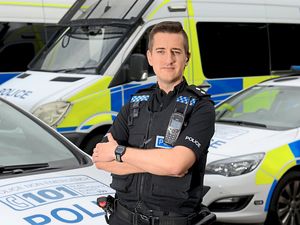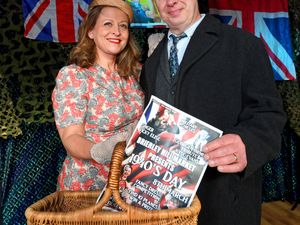What it's like to be a police officer: It's nice to be helping others
"You can't beat that feeling of helping people and having a positive impact on their lives," says police inspector Lee Page.

Since October last year, the 31-year-old has been on the College of Policing's direct entry programme with West Mercia Police.
It's been an evolutionary journey for Lee, who has gone from reporting on crimes as a journalist to helping those who have fallen victim to them.
And now he is relishing the opportunity to make a difference in the community.
"It's been brilliant to be able to get stuck in and going out to help people when they need us the most." he says.
He had started out in a career in radio journalism working at stations, including The Wolf in Wolverhampton.
His job put in him contact with police officers, which in turn sparked a fascination with the job they did.
In 2009, he was able to combine his journalistic skills with this growing interest by starting work in the press office at West Midlands Police.
"This was the best of both worlds because I was able to develop that interest in policing while contributing to building a strong relationship between the police and the public," explains Lee.
He took it a step further by spending two years as a Special Constable with the force, working shifts in south Birmingham.
Then, in March last year, he began the process of applying for the College of Policing's direct entry inspector programme - a new scheme aimed at bring new perspectives, skills and experience into the police service.
"It was recommended in a Government review as a way of bringing diversity of thought into police leadership. Traditionally, you would have to rise through the ranks of police constable to inspector to superintendent. But with direct entry you start at the rank of inspector or superintendent depending on the programme.
"The belief is that people with other experience outside of policing can bring fresh ideas into policing at a high level. I felt that from my 10 years of experience in journalism and in press offices that I had a range of transferable skills at the level that the direct entry programme was looking for," explains Lee.
As well as a telephone interview, he had to undergo a two-day assessment so they could check that he had the desired leadership skills.
Then he had another interview with his chosen police force, West Mercia, who offered him a place on the programme.
Lee is one of 17 new inspectors across the country including his colleagues Suki Gosal and Chloe Barnes working in Worcestershire and Warwickshire respectively.
He spends a large portion of his time doing hands-on police work, such as attending 999 calls, responding to requests for help and patrols, and has recently spent three months based at Kidderminster Police Station. He also attends the College of Policing in Coventry.
"The idea is that we already have 80 per cent of what is needed to be an inspector like decision-making and management skills and it's just the 20 per cent policing and law knowledge that we need," he says.
In October 2018, he will put everything he has learned to the test by taking the Police Inspectors' Exam.
For Lee the job is all about people and trying to have a positive influence on their lives. "I enjoy all of the interactions I have with all different types of people.
"I've been to places where I have seen the relief on people's faces when we've been able to help whether it's a domestic incident and we've been able to intervene and defuse the situation.
"Some times it's helping people who have never had any contact with the police before. I went to a car crash involving an elderly couple and a double-decker bus.
"It could have been a lot worse but they were just incredibly shaken. They needed the reassurance and support that having the police there brings, for someone to talk to them through every thing and tell them there is no need to worry. It's very satisfying being able to help people in that way." he says.
It has also been an 'eye-opening' experience, Lee tells us. "The police tend to deal with the margins of society, which people don't generally see.
When you are involved in this kind of work everyday you really see the societal struggles people face and the vulnerabilities people have.
You see the complexities of life and how this can drive some people to crime and can cause others to be the victims of crime," he explains.
He said he had been overwhelmed by the support the police and other emergency services had received in the aftermath of the terrorist attacks in Manchester and London.
"After what happened, I was quite humbled by the number of times we would go out to people who had been the victims of burglary or were having a domestic incident and they would say 'I'm sorry for wasting your time'.
"I would be thinking 'you've just been burgled or you need our help, of course we're going to be here'. The support we've had from people has been amazing," he added.
*West Mercia Police is currently recruiting for Special Constables and more information is available from www.westmercia.police.uk
*For details about the direct entry programme see www.college.police.uk




